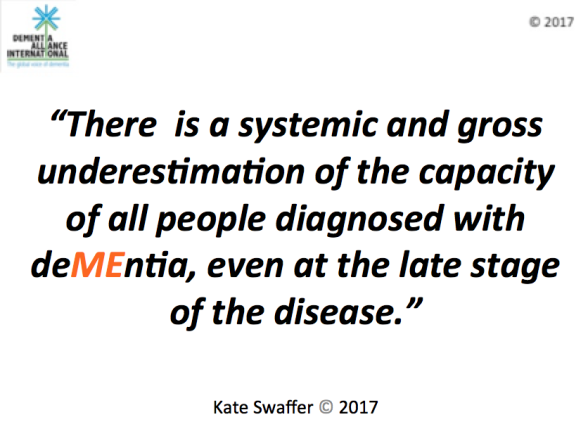 The global advocacy movement of people with dementia speaking out, and the many books, articles, and blogs or stories written by people with dementia globally certainly highlight this. Those of us who appear publicly as speakers or are involved in our communities in other ways and who appear to be 'living well with dementia' but who have also been formally diagnosed with dementia, are often being accused of faking having dementia...
The global advocacy movement of people with dementia speaking out, and the many books, articles, and blogs or stories written by people with dementia globally certainly highlight this. Those of us who appear publicly as speakers or are involved in our communities in other ways and who appear to be 'living well with dementia' but who have also been formally diagnosed with dementia, are often being accused of faking having dementia...
This has become systemic, and could easily be considered a form of bullying, and it must stop. Ignorance is no longer an excuse. One of DAI's new board members Brian Le Blanc @TheALZ_Guy, has written two powerful blog posts about his own personal experience of this recently, and which we are sharing here today as we lead up to the ADI Kyoto conference next week, as a reminder that whilst people are being diagnosed earlier in the disease process of dementia, it is completely logical they will not act or look as if they are in the late stages of the disease at the time of their diagnosis.
Part 1: So . . . You Think I’m Faking my Alzheimer’s Disease, do you?
"Imagine my amazement when through recent conversations with some close acquaintances, I was told that there are individuals who think I am FAKING my Alzheimer’s Disease. Yeah, I know, right?
First off, HOW IN THE HELL DO YOU FAKE ALZHEIMER’S DISEASE???
- I’ve had brain scans. Did I manipulate them by turning my brain off, not thinking anything while in the scanner?
- I’ve been diagnosed, not once, not twice, not thrice, but 4 freakin’ times
by a Neurologist, a Neuropsychiatrist, and two Neuropsychologists (appointed by the Social Security Administration, who by the way, declines benefits until no stone is unturned). Did I fake not remembering how to draw a clock or another type of shape? Did I fake remembering the 4 words I was told 5 minutes ago? - Do I fake every day not remembering things from 1 minute, 1 hour or 1 day ago
- I’ve had my driving privileges taken away by my Dr. for it was determined I no longer have the cognitive abilities or proper reaction time to operate a vehicle. Did I fake that too?"
Follow the link to read the full article by Brian Le Blanc, first published on his website on April 11, 2017.
Part II: So . . . You Think I’m Faking my Alzheimer’s Disease, do you?
"PART II (hey, that rhymed with ado! It’s amazing what a person with Alzheimer’s can do!)
I will start with a quote from the “Invisible Disabilities Association“
'In general, the term disability is often used to describe an ongoing physical challenge. This could be a bump in life that can be well managed or a mountain that creates serious changes and loss. Either way, this term should not be used to describe a person as weaker or lesser than anyone else! Every person has a purpose, special uniqueness, and value, no matter what hurdles they may face.
In addition, just because a person has a disability, does not mean they are disabled. Many living with these challenges are still fully active in their work, families, sports or hobbies. Some with disabilities are able to work full or part time but struggle to get through their day, with little or no energy for other things. Others are unable to maintain gainful or substantial employment due to their disability, have trouble with daily living activities and/or need assistance with their care.'"
Follow the link to read part 2 of this topic, by Brian Le Blanc, first published on his website on April 14, 2017.
Finally, if you have not watched this DAI Master Class yet, please take the time to do so. You will learn a lot, and hopefully if you have ever accused someone of faking it, it will change your mind and heart.
